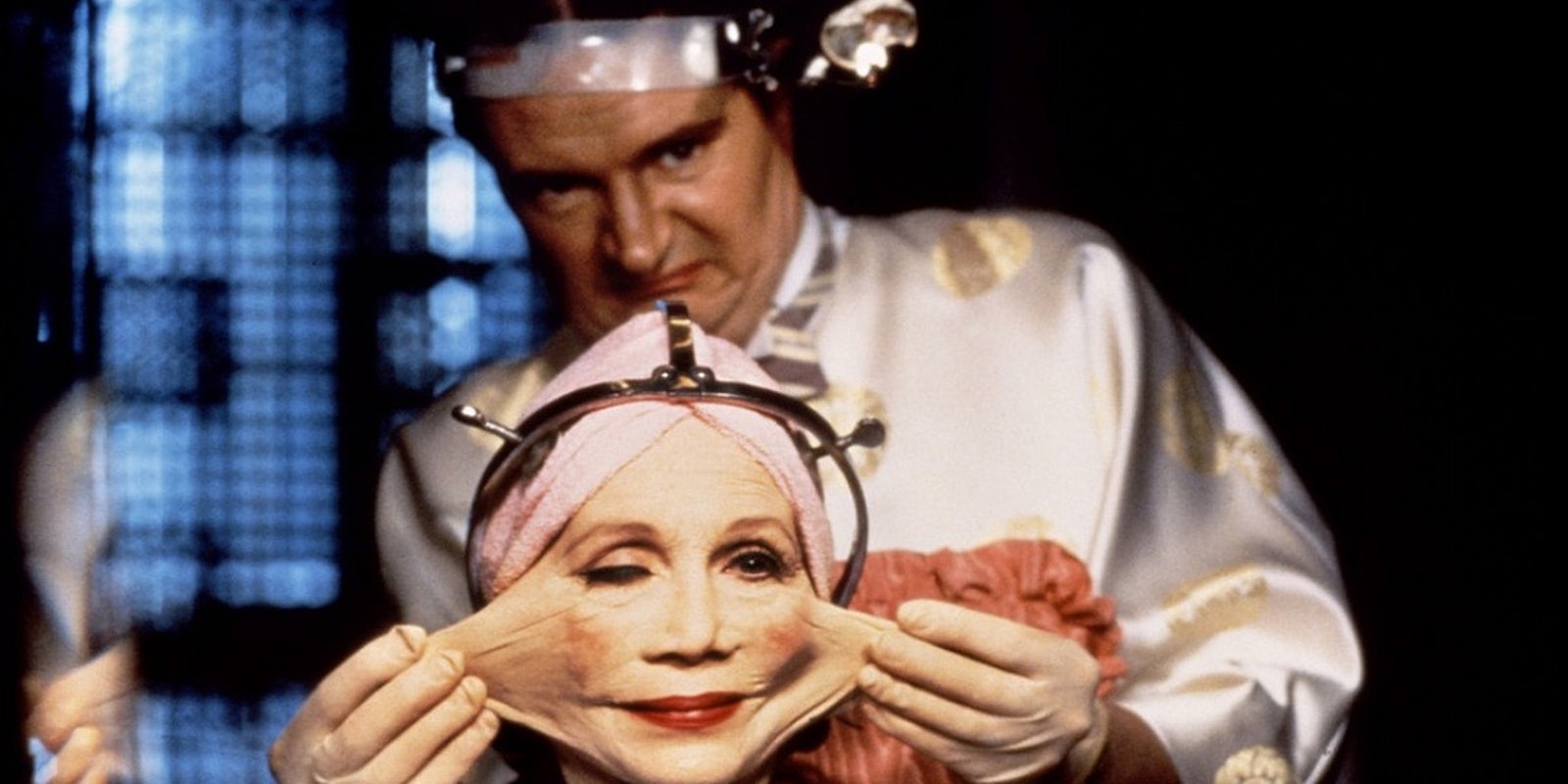“You shouldn’t watch movies on your iPhone. And if I catch anybody doing it, you die.”
That’s what the great Terry Gilliam proclaimed to a small crowd in an Apple Store on Tuesday evening. The joke wasn’t lost. We were all sitting within the halls of the tech behemoth, which had just recently announced the sixth (and sixth plus) iterations of its smartphone and an accompanying uber watch. While the crowd hiving around us was dreaming up the latest in wearable tech, here sat before us quite possibly the biggest fan of real life, wearing a rattail and laughing his ass off.
For many in the anxious, excitable crowd, this would be their first time in the presence of the American Python, the accomplished director of Brazil, Fear and Loathing in Las Vegas, and The Fisher King, to name only a few from Gilliam’s magical realist portfolio. As Gilliam sat on stage, wryly answering questions about his new sci-fi epic The Zero Theorem, it became evident that at the age of 73, the director has nothing left to prove. He’s merely in it for the storytelling.
The Zero Theorem follows the rapidly unraveling life of a computer savant with hermit-like, though not misanthropic, tendencies. Qohen Leth (played by a nearly unrecognizable Christoph Waltz), is a hairless, drab, and diligent coder who’s almost medically committed to referring to himself in the royal we. Qohen is assigned to the impossible-to-solve zero theorem project—an attempt by his all-seeing corporate employer, Mancom, to prove that everything means nothing. Qohen, who is quite comfortable being alone, is soon consumed by the theorem’s task (prove 100 percent = 0). Visits from a seductive sex worker named Bainsley, a digital therapist Shrink-Rom, and the management’s irreverent son Bob puncture the solitude. Like a speculative Ecclesiastes, the film sees Qohen searching for the meaning of life, waiting for the call of destiny—without much luck.
“We’ve been waiting for a call all our life now, and, although the nature and the origin of our call remains quintessentially a mystery to us, we can’t help but hope that it will provide us with a purpose we’ve long lived without,” Qohen explains to a listener, matter-of-factly.
It’s clear that Gilliam’s playing a prank on our hyper-connected, ever-stimulated world. The Zero Theorem reads as the untidy third segment of a futuristic trilogy comprised of two of Gilliam’s previous films, Brazil (1985) and 12 Monkeys (1995). Gilliam is pinching in on the absurdity and exasperation of modern living, but you couldn’t quite call the world inside The Zero Theorem a dystopia. In Qohen’s bustling world, perfectly coiffed characters run around in rainbow colored latex and colorful advertisements hilariously stalk pedestrians down the street. Life is plugged in, it’s under constant surveillance, but it’s also incredibly fun.
Gilliam explains, “People refer to this film as a dystopia. I think it’s a world of happy people. It’s color and light out there. It’s fun. The workplace is a joy. You can bring your roller blades or your scooter to work. It’s only one man who can’t come to terms with this very energetic and happy world.”
In a way, 2014 is a happy, amplified world, too. Facebook sees 829 million active daily users, voluntarily logging onto social media and generously sharing their basic hopes, fears, hamburgers, and minutiae with the world. “We have so much information dumped on us. It’s fascinating. I’ve now become a complete victim of my computer. It’s easier than actually having to do the work that I have to do on any single day,” Gilliam admits. Gilliam is a Facebook-addict, even if it’s driving him partially insane.
If Spike Jonze’s 2013 sci-fi romance Her was about technology’s slow transformation into an emotional, humanoid form, The Zero Thereom is about technology—the Facebooks, the Twitters, the Instagrams, the foward-looking Mancoms—chipping away at our own humanity, leaving us unable to step away from our computers and go get the girl. Gilliam jokes that if Descartes were around right now, it’d be “I tweet, therefore I am.”
The Zero Thereom‘s main character may seem like a balding, surly Sisyphus, so it’s only fitting that Gilliam’s career has also been flexing against the great hill of big studio cinema and misfortune. His 2009 film The Imaginarium of Doctor Parnassus was brought to a halt with the death of the film’s star Heath Ledger. Gilliam’s been trying since 1998 to get his retelling of Don Quixote off the ground, with several misattempts at production. Despite studio censorship, financing mishaps, and tragedy, the comedy maverick continues to charge up the hill.
What is Gilliam still searching for? “Money,” he jokes. Then, more seriously, “I don’t know if I’m searching for anything. I just react in a very infantile way to things that intrigue me and then I want to make a film about it. I see it, then I either want to put it into my mouth or into a camera. One of the two.”
Even if an imperfect film, The Zero Theorem is still posing a question that nagged at all of us, seated in the Apple Store, intermittently checking our iPhones during the talk. Can we disconnect? “Or do you want to just spend the rest of your life being a neuron, or just one end of a neuron, that you only exist because you connect to other people?” Gilliam asks the crowd. It’s not a question he has an answer to, but as long as Gilliam has access to a camera, some makeshift costumes, and a perhaps an Academy Award-winning star or two, he’ll keep anxiously tilting at the cinematic windmills.
Photo via Xentido! UxD/Flickr (CC BY 2.0)
This article originally appeared at Nerve and was reprinted with permission. Check out more great content at Nerve: House Hunting and Meredith Graves and the War on Female Fandom.


